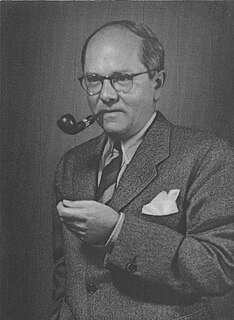
Music hall is a type of British theatrical entertainment that was popular from the early Victorian era, beginning around 1850. It faded away after 1918 as the halls rebranded their entertainment as variety. Perceptions of a distinction in Britain between bold and scandalous Victorian Music Hall and subsequent, more respectable Variety differ. Music hall involved a mixture of popular songs, comedy, speciality acts, and variety entertainment. The term is derived from a type of theatre or venue in which such entertainment took place. In North America vaudeville was in some ways analogous to British music hall, featuring rousing songs and comic acts.
Joseph Tabrar was a prolific English writer of popular music hall songs. His song "Daddy Wouldn't Buy Me a Bow Wow" (1892) became Vesta Victoria's first major popular success.

Richard Armstrong Whiting was an American composer of popular songs, including the standards "Hooray for Hollywood", "Ain't We Got Fun?" and "On the Good Ship Lollipop". He also wrote lyrics occasionally, and film scores most notably for the standard "She's Funny That Way".
"Embraceable You" is a jazz standard song with music by George Gershwin and lyrics by Ira Gershwin. The song was written in 1928 for an unpublished operetta named East Is West. It was published in 1930 and included in that year's Broadway musical Girl Crazy, performed by Ginger Rogers in a song and dance routine choreographed by Fred Astaire.

Winifred Emms, best known by her stage name Hetty King, was an English entertainer who performed in the music halls as a male impersonator over some 70 years.
"Take Me Back to Dear Old Blighty" is a music hall song written by Arthur J. Mills, Fred Godfrey and Bennett Scott in 1916. It was popular during the First World War, and tells a story of three fictional soldiers on the Western Front suffering from homesickness and their longing to return to "Blighty" - a slang term for Britain.
Charles William Murphy was a prolific British composer of music hall and musical theatre tunes.
Music hall songs were sung in the music halls by a variety of artistes. Most of them were comic in nature. There are a very large number of music hall songs, and most of them have been forgotten. In London between 1900 and 1910, a single publishing company, Francis, Day and Hunter, published between forty and fifty songs a month.

Ship Ahoy is a rhythm and blues album by Philadelphia soul group The O'Jays, released on November 10, 1973 on Philadelphia International Records. The album was a critical and commercial success, reaching #1 on Billboard's "Black Albums" chart and #11 on the "Pop Albums" chart and launching two hit singles, "For the Love of Money" and "Put Your Hands Together." Conceived as a theme album built around the title track, Ship Ahoy includes socially relevant tracks and love songs under a cover that is itself notable for its serious subject matter. The album, which achieved RIAA platinum certification in 1992 for over 1 million copies sold, has been reissued multiple times, including in a 2003 edition with a bonus track. Ship Ahoy was the highest selling R&B album on the Billboard Year-End chart for 1974.
Fred Godfrey was the pen name of Llewellyn Williams, a World War I songwriter. He is best known for the songs "Take Me Back to Dear Old Blighty" (1916) and "Bless 'Em All" (1917), a 1940s hit recorded by George Formby that can be found on many war films.
Jack Tar is a common English term originally used to refer to seamen of the Merchant or Royal Navy, particularly during the period of the British Empire. By World War I the term was used as a nickname for those in the U.S. Navy. Members of the public and seafarers alike made use of the name in identifying those who went to sea. It was not used as a pejorative and sailors were happy to use the term to label themselves.
Bennett Scott was an English writer of music hall songs.

George Arthurs was an English songwriter, playwright, composer, author and screenwriter who contributed lyrics to several successful musical comedies such as The Belle of Mayfair (1906), Havana (1908) and Yes, Uncle! (1917), before writing dialogue for such films as The Yellow Mask (1931).
William Frederick Bridgen, known professionally as Fred W. Leigh, was an English lyricist who co-wrote several popular music hall songs of the early twentieth century,
Henry Castling was an English lyricist of music hall songs.
Arthur John Mills (1872–1919) was an English lyricist of music hall songs, many written with Fred Godfrey and Bennett Scott.
Elinor Maud Dawe, who used the stage name Ella Retford, was an English music hall comedian, singer and dancer, and later a stage and film actress.
Gifford Folkard, known professionally as Harry Gifford, was an English songwriter. He worked from the 1900s but is best known for his work in the 1930s co-writing songs with Fred E. Cliffe for entertainer George Formby.
John Patrick Harrington was an English lyricist of music hall songs, and writer.





